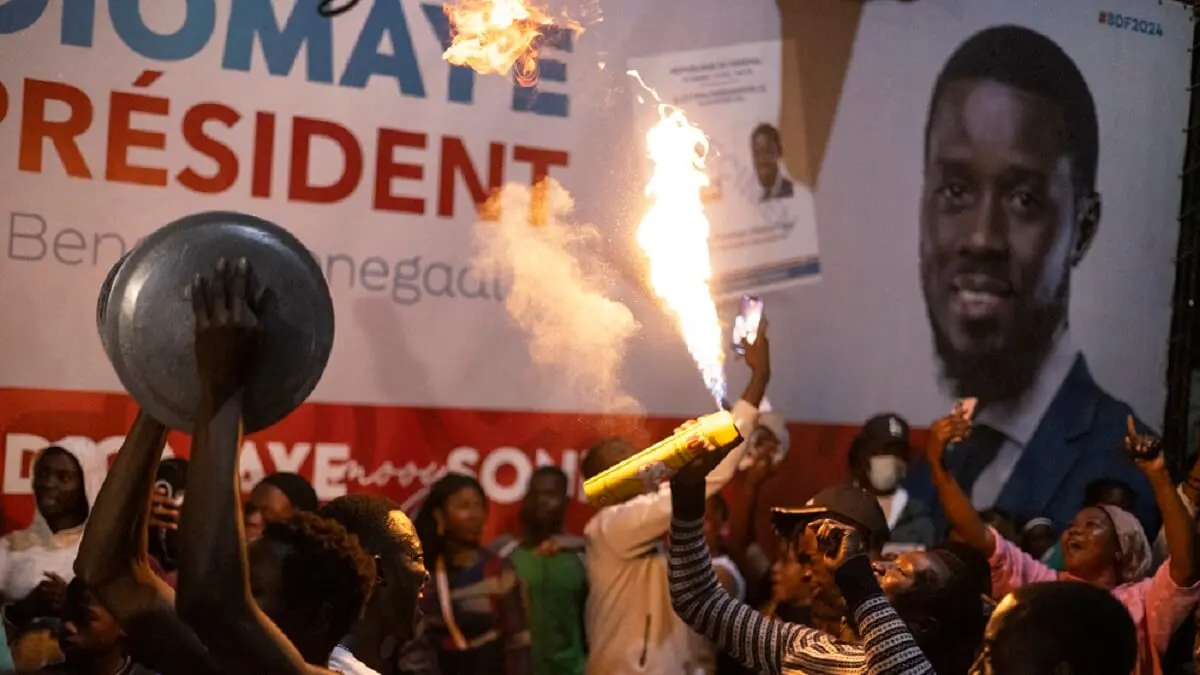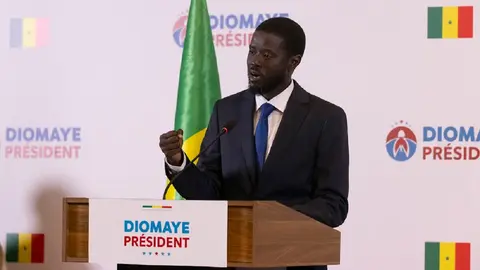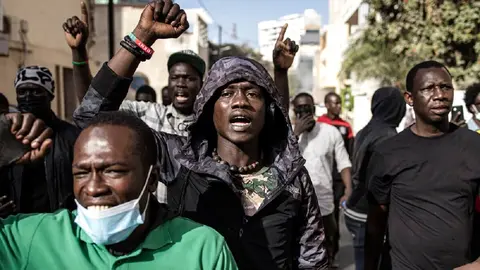Change and rupture in Senegal after Bassirou Diomaye Faye's triumph

From prison to the country's presidency. Barely two weeks before Senegal's decisive presidential elections, Bassirou Diomaye Faye was serving time in Cap Manuel prison, located in the southernmost suburb of Dakar, for his alleged crime of "contempt and delegitimisation of the powers of the state".
He had committed it a year earlier, on 14 April 2023, when he denounced the "extreme impoverishment" of the judiciary, in reference to the suspicions of political corruption of the magistrates who endorsed the ban on the candidacy of the main opposition leader, Ousmane Sonko, the great adversary of President Macky Sall, who, after twelve years in power, aspired, if not to run directly for a new mandate, then to direct his succession.
The political convulsions and turbulence caused by repeated attempts to silence or neutralise the opposition brought Senegal, the most stable country in West Africa since independence in 1960, into considerable disrepute. Despite this, Ousmane Sonko remained in prison and his party, Patriotes du Sénégal pour le Travail, l'Ethique et la Fraternité (Pastef), was banned.
Macky Sall manoeuvred to postpone the presidential election "sine die", although he later backtracked and called it by surprise for 24 March, no doubt to prevent the opposition from reorganising its ranks. In the end, however, these manoeuvres were futile, given that the result gave Bassirou Diomaye Faye, Sonko's replacement candidate, almost an overwhelming 54% of the votes in the first and therefore decisive single round.
As many as 19 candidates contested the elections, including only one woman, but with a clear favourite: former Prime Minister Amadou Ba, candidate of the Benno Bokk Yakaar (BBY), and therefore representative of a quiet continuity in the line of Senegalese power. All have been defeated by a programme of rupture and change, which will clearly mark a before and after in the history of Senegal, which is emerging as one of the most influential countries on the continent.
At least institutional stability has been preserved, as the defeated Ba and President Sall himself acknowledged Diomaye Faye's victory when the vote count had exceeded 80%. The official proclamation of the results and the subsequent inauguration of the new president are scheduled for the end of this week.
The Senegalese people's unquestionable support for Diomaye Faye is also for his main supporter, Ousmane Sonko, and for the credibility of his honesty and that of his party, which he attests to. As head of the tax office for fifteen years, Sonko proclaims that he "never distracted a single franc despite the large amount of money he handled". A message of honesty that the explosive Senegalese youth have understood and believed, as opposed to Amadou Ba, one of the country's greatest fortunes, whose origins are widely suspected, according to his opponents.
In his first victory speech, Diomane Faye called for the reconciliation of all Senegalese, but did not renounce the implementation of a clearly breakaway programme. He denounced the CFA monetary system (the currency minted and backed by the Bank of France), which in the Pastef's view was a clear neo-colonial dependence on Paris. He promises a profound reform of the system of government, and makes economic patriotism the driving force behind all decisions affecting the country's business and financial muscle.
The latter is particularly significant as Senegal prepares to exploit the hydrocarbon deposits discovered along its coasts. The new president wants to break the long-standing curse that has afflicted so many underdeveloped countries that suddenly found themselves with the manna of oil and were soon plunged into chaos and a new and more miserable impoverishment.
Diomane Faye, who at 44 will become the continent's youngest head of state, will demand the renegotiation of contracts linked to both mining and oil and gas exploitation. He hopes that the expected revenues will help to tamp down galloping inflation and facilitate massive job creation, which in turn will stem massive illegal emigration, much of which comes to Europe via the Canary Islands.
As soon as he takes office, the new president will also have to tackle another important chapter: the agreement signed with the International Monetary Fund (IMF) in June 2023. A loan of almost 1.7 billion euros aimed at containing the budget deficit. In exchange, the IMF demands a drastic reduction in subsidies, the source of Senegal's huge debt. But in this respect, the new president reaffirms the country's sovereignty to decide which sectors of its economy to subsidise, while at the same time calling for the "rationalisation" of "massive and undue tax exemptions".
Finally, with regard to its role in the international arena, the new president's party advocates loosening ties with France and "rebalancing them with other powers that are more sympathetic to local needs". The new Senegalese president told Le Monde during the election campaign that "Senegal has built a formidable relationship with France, despite a painful history marked by slavery and colonisation. This cannot continue thanks to a neo-colonisation that keeps us constantly dependent [on Paris]". In the same interview, Bassirou Diomaye Faye left the door open to new agreements with other powers, especially Russia.
This new policy will also affect the already fragile Economic Community of West African States (ECOWAS), to which he proposes to directly cancel dependence on the CFA franc. It could mean the definitive collapse of ECOWAS, following the departure of three countries in the wake of their respective successive coups d'état.



